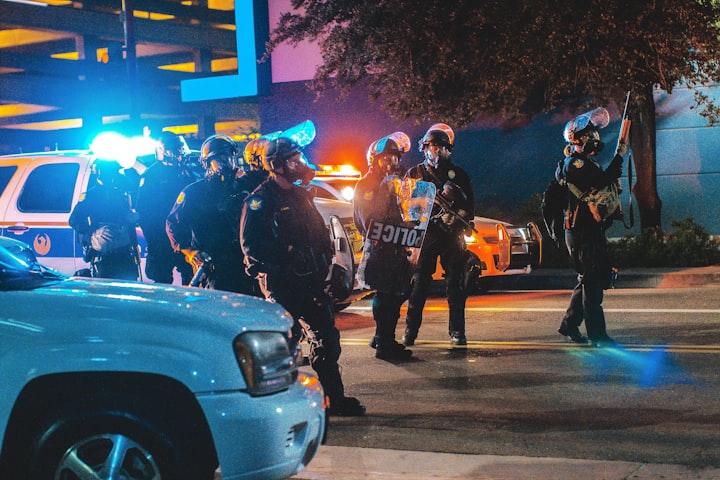Why Fear Is Your New Best Friend
Lessons from a life on the front line of policing

The call was to a disturbance. A man was in the process of trashing his council-owned house. It did not sound unusual, and I had the natural “butterflies in my stomach feeling.”
It took just a few minutes for my colleague and I to arrive on the scene where a Caretaker met us.
“He is round the back in the communal garden”.
We went through the back door, where I was confronted by a sight that sent a chill through me.
The man was on his knees, with a hammer in his hand, rocking back and forth. When he saw me, he started to growl.
There was no time for niceties in this situation. Here in the UK, I did not have a gun, so I had to rely on my wits, fighting ability, an extendable baton and a can of CS spray.
I drew my baton and said, “put the ******* hammer down now, or things are going to get ugly” (ugly for who, I was less sure).
The man got up slowly and then charged me with the hammer.
He swung it at my head. Fortunately, I managed to duck and get behind him. As I grabbed him, my colleague fired his CS spray.
The assailant ducked, and I got the entire shot in my face.
I thought things couldn’t get any worse than a madman trying to take my head off with a hammer, but suddenly I was fighting the madman while blinded and gasping for breath.
Luckily I still had hold of my attacker, so all I could do was throw him to the floor and step on his body to keep a feel for his location while my colleague put the handcuffs on him.
Finally, the threat was over. My vision was returning, but I still couldn’t see correctly. My breathing slowly recovered.
The caretaker collected my phone on one side of the garden and my radio on the other side.
It might surprise you to know that by the time we were back at the station, me and “hammer man” were talking like old friends.
None of this is personal. This man would have attacked whoever came into that garden, and I had to defend myself. That is all there was to it.
Another surprise might be that my Dispatcher sent me to the same man doing the same thing a few months later. This time he was still inside, trashing his house, which led to a hand to hand struggle without any weapons, which I won quickly.
Welcome to the never-ending cycle of life in the world of the underclass.
As someone who was bullied and downtrodden throughout my school life, how did I handle situations as described above without serious harm coming to anyone? Had I suddenly become fearless?
Hardly. I was terrified.
Two things had changed. I now had an intellectual understanding of fear, and I had frequent practice in feeling, confronting and overcoming stress.
What is Fear?
Wikipedia describes fear thus:
“Fear is an intensely unpleasant emotion in response to perceiving or recognizing a danger or threat. Fear causes physiological changes that may produce behavioral reactions such as mounting an aggressive response or fleeing the threat.”
This feeling sets up the age-old “fight or flight” scenario. If you can recognise fear, you can use its power to fight harder or run faster.
What is Courage?
“Courage is not the absence of fear, but rather the assessment that something else is more important than fear.”
― Franklin D. Roosevelt
We now know that we cannot eradicate the fear response. People who claim not to fear are either lying or have a psychological problem.
Do not wait for fear to dissipate. That will never happen. Instead, stare it straight in the eye and move forward.
My first mentor in overcoming fear was Geoff Thompson, a highly-skilled Martial Artist and a bouncer in Coventry. Like me, Thompson was a weak and bullied child who turned his life around.
Thompson speaks extensively about fear:
“There has never been a greater illusion than fear. Fear exists only whilst you believe in it — whilst you fear it. So…stop believing, stop fearing. Set up a shadow inventory, write down all your fears and set out on your warrior path. Make this your life purpose and gold will be smelt from your terror.”
In his book “Watch my Back”, Thompson describes how he still felt fear regardless of how tough he got. He asked his colleagues and fellow martial artists if they also felt fear, and they denied it. The same thing happened to me.
Eventually, he learned that fear never goes away. We learn to control it better and do what is necessary regardless. Such mastery over the fear response is the true definition of heroism.
Another pioneer in the field of confronting our fears is Susan Jeffers.
Jeffers has written several excellent books, but it all started with “Feel the Fear and Do it Anyway”. She states:
“The only way to get rid of the fear of doing something is to go out and do it”.
She also says:
“Remember that underlying all our fears is a lack of trust in ourselves.”
How You Can Develop Courage.
The more experience you have confronting a particular fear, that fear will reduce. However, when you move on to something new, your trusty fear response will kick in again. So do not fight against nature.
Do not try to live your life in the Comfort Zone. The more you hide from adversity and the less you push yourself, your confidence will be low, and you will feel progressively more scared in every aspect of your life.
The more you practice facing your fears and overcoming them; your confidence will grow.
Smash that comfort zone. Realise that you are most successful in life when you are uncomfortable and that winners constantly push themselves. Don’t be afraid of setbacks and failure. Be proud that you are in the arena giving it your best.
I would also recommend creating space between you and the situation, causing fear and thinking about it objectively.
Most of the things we feel frightened about will not kill us. My opening example was an exception, but most of our fears revolve around trying new things, changing our circumstances and building relationships with others.
Focus on what is happening, not what you fear will happen.
Conclusion.
In this article, I have shown you an example of where I worked with fear and overcame my instinct to run for my life. I have also broken down what fear and courage are and suggested ways to improve your life.
To end, here is a quote from Epictetus concerning my favourite philosophy — Stoicism:
“The chief task in life is simply this: to identify and separate matters so that I can say clearly to myself which are externals not under my control, and which have to do with the choices I actually control. Where then do I look for good and evil? Not to uncontrollable externals, but within myself to the choices that are my own…” — Epictetus, Discourses, 2.5.4–5
Devote your time and energy to things you can control and that are important. Work on eradicating your fear of things you cannot influence.
It is a lifelong process to master your emotions, but the journey is paved with many sweet successes, and you can begin changing your life immediately.
The best time to change is always now.
About the Creator
Leon Macfayden
From a police officer to a psychiatric ward and recovery.
Grab my new FREE checklist for the top 5 books that will change your life starting today.
From fear and worry to courage and success.
Turn adversity into advantage.






Comments
There are no comments for this story
Be the first to respond and start the conversation.